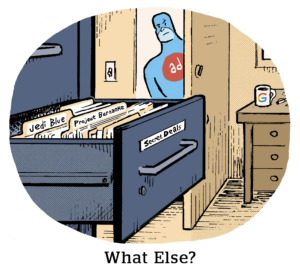 Megaplatforms such as Google, Facebook and Amazon dominate every marketing niche they occupy, but they are still in the early stages of honing their measurement, targeting and advertising.
Megaplatforms such as Google, Facebook and Amazon dominate every marketing niche they occupy, but they are still in the early stages of honing their measurement, targeting and advertising.
In what will be a recurring theme in 2016, walled-garden players are still trying to formulate and communicate what value their data brings to brands, according to several speakers at AdExchanger’s Industry Preview conference on Thursday.
Facebook’s digital video initiative is a good example of an ad strategy that has achieved widespread adoption – Facebook claims it generates 8 billion video views daily – but still requires significant investment before the company even knows how effective the product is for brands. Figuring out what data agencies need to have in order to invest bigger budgets into video will be a priority in 2016, said Patrick Harris, Facebook’s director of global agency development.
Amazon VP of global ad sales Seth Dallaire echoed similar sentiments when describing the ecommerce giant’s priority for data and marketing on the platform this year. “(We are) trying to help agencies and advertisers understand the types of reporting and interpret the events on our platform.”
Data that can inform marketers, including how users interact with brand pages, product reviews or their online shopping cart, is first and foremost a part of the Amazon user experience. “Understanding the purchase funnel was something we had to develop for ourselves,” Dallaire said.
Dallaire, Harris and other platform leaders are finding that walled-garden frustrations are as real for those on the inside as they are for marketers hoping for a peek in. Harris, for instance, said he’d prefer to never hear the term “walled garden.” He’d replace it with “privacy garden,” arguing that Facebook is bound by its user terms of service as strictly as marketers are bound by advertising policies.
Many agency execs acknowledge that it won’t be their knocking on the door that lowers the gates of walled gardens. Instead it will likely be rivals “nipping at their heels,” as Merkle CSO John Lee put it last year.
Non-walled garden digital denizens are trying to rival Facebook’s deterministic identity targeting with probabilistic methods, according to Drawbridge founder and CEO Kamakshi Sivaramakrishnan, who also spoke Thursday at Industry Preview.
These methods include looping in third-party data from increasingly diverse channels, such as retail, connected devices and TV networks.
“Even the walled gardens don’t have a perfect understanding of identity across screens and channels,” Sivaramakrishnan said. “We implore this industry to not think of it as taking a chance on identity, but developing algorithms that are accurate enough and viable enough as a solution.”
There may be more similarities than either side chooses to admit. The best cross-device identity triangulation being developed by firms outside “privacy gardens” is also a kind of “black box, but with very clear outputs,” Sivaramakrishnan said.
As probabilistic matching turns into a black box by the nature of its complication, Facebook is in overdrive trying to find ways to communicate insights back to agencies, such as its recent road show promoting Facebook IQ, a consumer research unit.
Google, meanwhile, made waves last year when it debuted email and user targeting based on a brand’s first-party CRM data. Google’s struggle to rationalize marketers’ needs with privacy concerns shows how delicate the maneuvering must be, even when the platform wants to open up to clients. Google also had to create new restrictions on what data could or could not be deployed, plus an alert and education program to update Gmail users on the new policy.
Walled gardens are so called because of marketer aggravation (or envy, even) about being left outside the walls. But it’s easy to forget about the “garden” part of the phrase, which is the overarching effort to create an environment people want to return to.
“For us, the area of focus for 2016 will be providing better measurement for events on our platform,” Dallaire said.
Whether it’s users or advertisers who reap the benefit remains to be seen.














